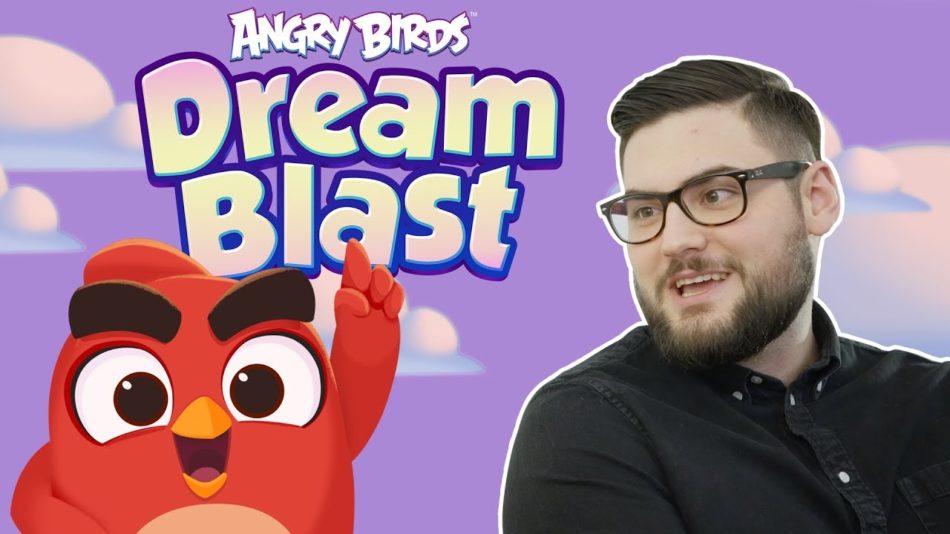
Follow the audio journey of sound designer Can Uzer, from playing drums in Turkey to designing sound effects for Rovio games.
Rovio Sound Designer, Can Uzer, knew he wanted to pursue a career in music from the moment he heard Metallica’s 1991 Black Album. Since then, Can has made it his goal to fill his life with music, performing as a drummer in many musical projects in his home country of Turkey.
Originally studying archaeology, Can decided to turn his love of music and sound into a career, shifting his focus to audio engineering. He earned degrees first in audio engineering in Istanbul, and then sound design at Aalto University in Helsinki, Finland, where he was a freelance audio designer for a number of years before joining Rovio’s Audio team. Now at Rovio, Can designs and implements sound effects in many of Rovio’s most popular and beloved games, including Angry Birds Dream Blast, and Sugar Blast.
We spoke with Can about his history with music, games, and his experience working in the Rovio Audio team. Read the full interview below.
Can you walk us through what you do at Rovio?
As a sound designer, I’m working mainly with Rovio’s games, where I design sound effects and implement them in the game, as well and doing a bit of coding every now and then. Sound effects also includes voice-overs, but I also do music implementation, which means taking the music tracks and setting them up in the game, most of the time in a dynamic way. Apart from that, I also lead audio design and production for some of the game projects and do some project management for those, and sometimes a bit of supervision with external collaborators.

Behind the Adaptive Audio in Angry Birds Dream Blast
The adaptive audio in Angry Birds Dream Blast earned the Rovio Audio team a nomination for Best Sound Design in the 2019 Game Audio Awards.
On a day to day basis, I’m involved with multiple things because the audio team works with all of the game projects. So every week is usually divided between a few different projects. Each member of the team has different responsibilities in each game so I make sure that issues are solved in my projects and that new features are being supported.
When I start my day, what I do is first of all I just look at the projects and play the games to see what is missing or what needs work. I check our project management tools to see if there are any bugs or issues that need to be addressed with regard to audio, that involves a lot of testing in the game engine. I also keep an eye on the roadmap for new features that need to be developed for updates and new games.
So you’re not just squishing watermelons all day?
Well, that’s what my mom thinks I do [laughs], but on a daily basis a lot of the time I’m working on code and going through project spreadsheets as well. The squishing melons stuff does happen, but usually when we’re launching a new update. If there’s a new feature, it might need a new sound design or sound effect. Or if we are developing a new game from the start there might be a few weeks of sound design sprint. In that case I usually first play the game, talk with the team, figure out what sounds are needed, and then kind of dive into designing those sounds.
How do you approach designing audio for new games?
Usually, I start by creating an audio design document, which is kind of like a moodboard. It has bullet points and audio examples of what the sound and music references are. At that point I do a lot of back and forth with the rest of the audio team. Even before we start that, we usually have ideas in our heads that we share in a casual setting. During lunchtime we might talk “hey, this game should sound like this and that” so there are already some ideas going on naturally. And when you start putting them down and you start sharing it with the team they show which ideas they like the most or what should be added, what should be avoided. Usually that is in the preproduction process.
It’s very abstract. People usually don’t know how to talk about sound or how to describe a sound. They usually use really abstract terms. So when we do these kinds of documents, it usually helps people to get on the same page vision-wise so it’s kind of a good way of materializing what the game will sound like.
Do you have a framework or rules for approaching sound in Rovio games?
Each game has unique needs, but I will usually limit myself to a certain set of characteristics for each project. That helps me focus, and make consistent design. In one game I might commit to only using organic sounds. I’m not going to use anything digital. And in another game it might be that I don’t use any human voices. Everything is going to be those iconic sounds that communicate meaning through just sound effects.
Limiting myself helps me focus, and make consistent design.
One example is our game Hardhead Squad, which is currently in soft launch. We decided to use different musical elements for different notification sounds. For example, for scouting actions there is always a wind instrument signifying that this is a scouting action. For combat related things, there will always be a drumroll. In this way, you don’t even have to look at the corner of the screen. Just by listening, you always know the information you’re being given.
Another example where we limit ourselves to create the overall tone of the game, in Sugar Blast, we’ve been trying to make everything sound sweet. Nothing sounds too destructive or harsh. We’re trying to keep everything in a kind of sweet and cute style. It’s about trying to figure out what sounds more pleasant to the ear and what sounds make you say “oh, I just want to grab the screen and pinch its cheeks” [laughs].
Did you always see yourself having a career designing sound for games?
Before I started working with sound, I did a bunch of different things. I started a bit late. I have an archaeology degree, which I haven’t followed [laughs]. As a drummer, I was in a lot of bands, doing covers and some originals also. I did some touring and stuff, playing semi-professionally in clubs, but then I realized that I want to do something more with sound and music so I started to study at a sound engineering school in Istanbul.
working in games was kind of a very distant idea, it didn’t seem like a reality to me, but the idea was there. I was thinking maybe someday.
I wanted to focus on more of the tech side of music. At that point, working in games was kind of a very distant idea, it didn’t seem like a reality to me, but the idea was there. I was thinking maybe someday. I was focusing my energy on music tech. I started doing some film as well, and I realized if I can do film, maybe I can also do games, but I was in Turkey back then and it’s difficult to find that kind of work there. I realized Finland is a good option. So I came here to study in a master’s program in sound design (Aalto University, Sound in New Media), and there I specialized in game sound. Since then I’ve been doing mainly game sound.
Are games something you have always been interested in?
Yes, I’ve been playing games since my early childhood. My aunt and uncle worked in software development so the first video game I played was on their Amiga. My family’s first computer was a Commodore 64, and then when I was ten, we got our first PC. My brother and I were already customizing our PC, getting better graphics cards, also going to the computer store to get games on floppy discs. Or we would buy CD ROMs if I saved some money. I remember the first game we bought on CD was Command and Conquer. So I was playing a lot of games and I was into computers, I played a lot of tabletop RPGs as well, but I never thought of games as a career. It never occurred to me. I was so involved in music so that was my passion.
How did you get into music? What was the thing that started you on this path?
I was not interested in music until I was about seven years old. I remember I was hanging out in my neighborhood and there was this guy who was my friend’s big brother. He was wearing a cool black t-shirt and listening to music on headphones. I said “hey what are you listening to?” and he showed me Metallica’s Black Album and said “check it out”. So I checked it out and it was like BOOM [mimics explosion with hands]. I went home and I said “mom, I want this album” and she said “ok, I’ll buy you this album… if I can also buy you this Bon Jovi album”. She didn’t want me to get into metal [laughs]. She wanted to steer me toward more accessible music. But it didn’t work. After that, I was just a full-on metal fan.
A few years later when I was in middle school, one of my friends that I played RPGs with was a bass player and he said, “hey, why don’t you come to the studio with me. We need a drummer. You can play drums.” I did not know how to play drums. I just knew how to play air guitar [laughs]. I went anyway and I started hitting the drums. After that I thought, hey maybe I should learn this. It started from there. I started playing in the high school band. At the time I was a teenager and I was constantly getting into new bands and trying different genres like gothic, rock, punk, nu metal, improvisation, ethnic, all this kind of stuff.
Are there certain other games that you think have particularly awesome sound design?
I would say Inside is a great example. I like it because the sound design and the music are so intertwined together in a way where you don’t even know which one is which. It really smoothly follows what’s happening in the game. It’s just very emotional and fluid. Limbo is similar because sound is a part of the interface and in that kind of game, the sound is really integrated with the interface. You cannot have the same experience without the sound.
One of my other favorites is Command and Conquer. Maybe it’s nostalgia, but it has such a unique character. If you listen to a song or hear a sound effect from that game, you can immediately recognize it. It’s so characteristic. I can say the same thing for games like Diablo or Warcraft. I feel like they use such iconic sounds. In games now, just like in film music, there is a shift towards more abstract, stylized compositions. For example, if you look at Danny Elfman’s Batman, you will immediately recognize these signature sounds and melodies. Compare that with Hanz Zimmer’s music, and it’s much different. Both approaches can work though. I’m playing God of War right now, which takes a more stylized approach and it’s absolutely amazing. Everything is just so top notch. It’s such an impactful game. Every action in the game has this power and force and every sound in the game represents that and puts you in that environment.
One last example is Monument Valley. I like that because the game itself is quite minimalistic and quite stylized, and the sound and music really represents that. It’s kind of minimal tonal elements, and the sound effects work really well with the music. They are very musical. Every action you do creates these kinds of beautiful tonal layers.
How is working at Rovio different to your previous work?
Before Rovio, I was freelancing for a few years full time, and I did a lot of different projects. I did some console projects, some PC projects, mobile projects, AR, XR, mostly in the Helsinki area, but also international projects as well. Most of the game projects I did before as a freelancer were quite rushed. I worked with great people, but a lot of the time I felt like I was running out of time, I needed to do extra shifts. At Rovio there is still a lot to do, but somehow we manage to do it in a reasonable time in a relaxed environment without feeling this unnecessary pressure. I think that’s also because of the peoples’ vibe. I feel like there is this friendly accommodating vibe going on.
I have a sense that I belong here and it has allowed me to slow down a bit and appreciate the good things about this line of work
Working full time in a company every day and working with the same people has been a very positive experience for me honestly. I have a sense that I belong here. That I have a place. And it has allowed me to slow down a bit and appreciate the good things about this line of work instead of just always trying to go on to the next project.
